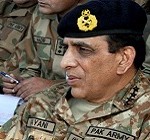Doubtless things are changing in Pakistan. Uncertainty, however, relates to the depth and longevity of the changes. It often resembles a one-step-forward-and-two-steps-backwards process rather than a move up to the next level.
So while it is true that the likely winner of the forthcoming election, Nawaz Sharif, did not try to overturn the Zardari government, it had a lot to do with his own experience of having been ousted by General Musharraf and exiled to Saudi Arabia for eight years than because of a genuine transformation into a democrat. The N in the name of his party, PML-N, stands for Nawaz and his brother remains the Chief Minister of Punjab, continuing a feudal, dynastic tradition.
The media, especially television and even print, is vibrant and often critical of the government and sometimes even of the military – but within well-understood limits. Incidents like the abduction and later discovery of the corpse of investigative journalist Saleem Shahzad, bureau chief of Asia Times, allegedly by the military, cast a chill on the independence of the press and took Pakistan eight notches down to hit 159th on the press freedom index of Reporters Without Borders.
The shock of the Osama bin Laden killing by American Special Forces in 2011 prompted every segment of Pakistani society to engage in open criticism of the military. After a brief show of contrition, the military used its clout to force the National Assembly to pass a Resolution turning the people’s anger into a condemnation of the “U.S. unilateral action in Abbottabad, which constitutes a violation of Pakistan’s sovereignty.” An event which had forced the people to confront evidence of the duplicity and incompetence of the military became instead one that caused the popularity of Pakistan’s most important benefactor, the U.S., to plummet to ever lower levels.
Even more telling in some ways was an early attempt by the government to bring the powerful Intelligence agency, the ISI, under the control of the Interior Ministry, which was overturned within 24 hours. Eroding the power and activities of the “State within the State” would be a good challenge for the civilian administration to attempt.
The legal fraternity in Pakistan has indeed become both activist and powerful, like the press. But the same lawyers who led the movement for the ouster of Musharraf in 2008 also threw rose petals on the assassin of Governor of Punjab Salman Taseer for speaking against religious bigotry in 2011. It remains an open question whether the activism of the judiciary will outlive the end of the term of the current Chief Justice Iftikhar Chaudhry at the end of this year who has certainly worked overtime to challenge both Musharraf and the civilian government of President Zardari. But is this more than a settling of scores against Musharraf who sacked him and Zardari who dragged his feet over his reinstatement?
Nevertheless all is not doom and gloom. Civil society in Pakistan and some academics and political analysts continue a lonely fight for a more rule-based, normal country at peace within itself – and with the rest of the world especially its neighbours India and Afghanistan, and its western benefactors.
Ambassador Neelam Deo is Director of Gateway House: Indian Council on Global Relations and former Ambassador to Denmark and former Joint Secretary for Myanmar, Sri Lanka, Nepal and Bangladesh.
This debate was exclusively conducted for Gateway House: Indian Council on Global Relations, titled ‘The civil-military equation in Pakistan has begun to tilt in favour of civilians.’ You can read more exclusive content here.
For interview requests with the author, or for permission to republish, please contact outreach@gatewayhouse.in.
© Copyright 2013 Gateway House: Indian Council on Global Relations. All rights reserved. Any unauthorized copying or reproduction is strictly prohibited.


